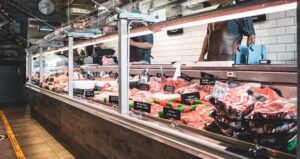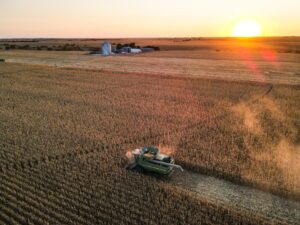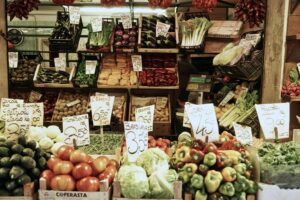
When it comes to deciding where to buy our food, cost, convenience, and proximity are things we all consider
There is no denying that supermarket chains can offer convenience, with all the products that we love in one place, which is why so many of us choose to spend our money with them. However, it is important to understand the benefits of supporting our local shops, to help our local economy thrive and lower our carbon footprint.
Food Miles
When it comes to shopping for food, it is important to consider food miles. The term ’food miles’ refers to the distance food travels from where it is produced to your plate. The higher the food miles, generally there will be more greenhouse gases emitted during transportation which contribute to climate change.
Supermarkets sell produce from around the country and the world, and therefore food travels long distances. Local butchers, grocers and bakeries often sell produce from farms that are within a shorter distance of their store and in doing so emit less greenhouse gases through transportation. In fact, shopping locally can reduce the greenhouse gas emissions associated with food by up to 44%, depending on the product. Food miles are closely linked to buying seasonally as when shopping for fresh fruit and vegetables, that can not be grown in the UK at that time of year, we can end up with grapes from Peru, baby corn from Kenya or apples from South Africa in our shopping basket which of course have travelled a long way to reach the shelves. If you want to learn more about seasonal eating you can go to the Eat Seasonably website to read more.
Less Waste
As supermarkets tend to import a lot of their produce, they risk the food being damaged in transportation and arriving at store in a non-sellable condition; the longer the journey, the higher the chance that the food won’t make it to customers and creates waste. To combat this many supermarkets transport food in protective plastic packaging which is often not recyclable and creates waste destined for disposal.
As food in local shops has often spent less time traveling to reach stores, produce doesn’t require as much protective packaging and can sometimes be stored for longer periods of time, reducing waste in store and at home. So, not only can shopping locally reduce your carbon footprint, it can also lower the amount of food and non-recyclable material wasted in our global supply chains and homes.
If you want to help tackle single use plastic waste, you can sign up to our single use plastic pledge on our council website. You could also read our love food, hate waste page if you would like to reduce your household waste.
Support Your Town
Shopping locally can support our towns and help them thrive. By spending our money locally, producers and stores can keep their doors open to customers and sell their lower carbon, fresher and less wasteful products. Councillor Alan Napier said, “if you invest £1 in a County Durham business, there is a high chance that business will spend that same £1 at another local business.”, in support of the County Durham Pound project. If you would like to read more about the benefits of shopping locally, please visit Gov.uk: eight reasons to Shop Local this week to help the high street bounce back.
Durham’s local, sustainable, food businesses
There are many small businesses that want to make a difference across County Durham. For example, in September 2022, the Refuse café in Chester-Le-Street promoted sustainable food choices through an exciting restaurant night. Read more about it in our previous article Foodies Experience Carbon Costed Restaurant Night.
If you want to explore local businesses in your area, visit the Green Durham website. This webpage will show a list of shops, activities, and suppliers in your area.






